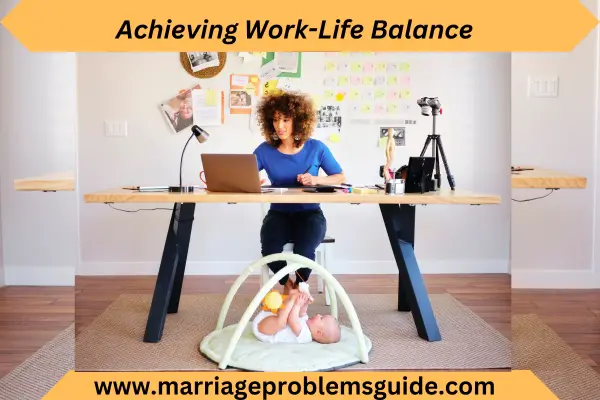Achieving Work-Life Balance
Balancing work and personal life can be challenging, especially when you have a busy schedule filled with responsibilities.
However, achieving work-life balance is crucial for reducing stress, improving productivity, and strengthening relationships.
In this blog article, we will talk about its importance and provide tips and techniques for busy professionals and couples to find harmony between their careers and personal lives.
Why is Work-Life Balance Important for Couples?
Trying to balance a career and personal life can be challenging for individuals, but even more so for couples.
When both partners have demanding work schedules, it can be difficult to find time together and maintain a healthy relationship. However, achieving work-life balance together is essential for couples for several reasons:
1. Reduces Stress
Excessive work demands and lack of personal time are leading causes of stress, which can strain relationships. Partners who feel overworked and exhausted at home are more likely to argue and less able to connect meaningfully.
Ensuring each person has time to recharge prevents stress from harming the relationship.
2. Strengthens the Relationship
Couples need quality time together to nurture intimacy and bonding. Work encroaching on personal life leaves little space for meaningful interactions, shared activities and romance to thrive.
Partners who successfully blend their careers and couple time report higher relationship satisfaction.
3. Allows for Personal Interests
When work takes over, neither partner has time to pursue individual hobbies, interests and self-care. This can breed resentment from losing a sense of identity outside the relationship.
Protecting personal time lets each partner maintain diverse interests so the relationship is not limited.
4. Improves Communication
Communication suffers when partners have limited quality interactions. Tension builds when responsibilities at home and work feel overwhelming.
Making couple time a priority provides an opportunity for open communication that prevents misunderstandings.
5. Sets a Good Example
For couples with children, finding balance between work and family life demonstrates a healthy approach. Kids observe and learn from their parents’ behavior.
Making your relationship and personal interests a priority teaches children how to establish a work-life balance.
In today’s demanding work culture, couples must intentionally protect their relationship and personal lives. The benefits of balance extend to individuals, couples and families.

Tips for Achieving Work-Life Balance With a Busy Schedule
Balancing promising careers with a rewarding relationship can seem impossible for couples with packed schedules. However, implementing some key strategies helps busy teams blend a successful work life with a thriving personal life.
1. Define Your Priorities
The first step is identifying what matters most in both spheres. Determine your core professional and personal values and goals. Understanding priorities helps you allocate time and effort accordingly.
For work, key priorities may include delivering high-quality work, career development, or maintaining strong client relationships. For personal life, priorities could be spending quality time with family, pursuing hobbies, or self-care. Defining priorities gives direction when making decisions.
2. Set Boundaries
Establish boundaries between work and personal life by setting limits on when and where you can be reached. Turn off work email and phone notifications during designated personal time. Communicate availability to colleagues and loved ones.
For example, restrict work talk during family dinner or don’t bring work devices on date night. Boundaries demonstrate what you value and prevent obligations from bleeding into personal time.
3. Schedule Intentional Time Off
While challenging for busy schedules, taking time away from work responsibilities is vital. Schedule PTO or occasional 3-day weekends for quality bonding, relaxation or pursuing personal goals.
Studies show time off reduces stress, boosts creativity, and makes you more productive overall. Use calendars to block off personal time and honor that commitment.
4. Maintain Open Communication
Talk to your partner, manager, colleagues, and clients about your priorities, schedules, and challenges. Solutions can be found when expectations and limitations are apparent. Perhaps deadlines can shift, or household responsibilities can be rebalanced.
Healthy communication also prevents resentment from festering. Frequent check-ins ensure alignment between individual and shared goals.

5. Leverage Technology
While technology can disrupt work-life balance, it can also help restore it. Features like calendar integration, task management, and automatic replies can improve efficiency.
Video calls keep you connected if schedules conflict. Set limits on being available digitally during personal time. Use tech to enhance, not hinder, your work-life balance.
6. Focus on Wellness
Stress and burnout compromise both professional and personal success. Prioritize healthy habits like exercise, nutritious eating, and adequate sleep. Build in small wellness practices like meditation during the workday.
Pursue hobbies that rejuvenate you. Vital physical, mental, and emotional health provides energy for fulfilling responsibilities across all life domains.
7. Reevaluate as Needed
Check in periodically to assess what is working and what needs adjustment as circumstances evolve. Keep communication open with partners and managers around changing needs or challenges.
Periodic reevaluation ensures your approach continues, enabling you to thrive professionally while making time for what matters most in life.
8. Set Boundaries
Discuss work expectations and limitations with employers and convey needs clearly to each other. Turn off work communications during designated couple or family time.
Communicate when you are not available so boundaries are respected. Protect personal time.
9. Take Breaks
While difficult to find time, taking regular breaks from work together is essential – even if just a shared lunch or occasional weekend getaway.
Schedule date nights or short vacations in calendars to ensure they happen. Time away relieves stress and reconnects you.
10. Say No
Achieving balance often requires saying no to additional responsibilities. Decline projects that would encroach on couple or personal time.
Be selective about events and obligations. Protecting your schedule means honoring priorities.
11. Take Care of Yourself
Make self-care, exercise, nutritious eating, and adequate sleep priorities. Taking care of basic needs prevents burnout.
Pursue personal hobbies and interests independently. Maintain your identity outside work. A break benefits the relationship, too.
Achieving a work-life balance with an overloaded schedule requires intention, communication, and often compromise. However, harmonizing the different spheres of your life will make you, your relationships, and your work more fulfilling.
Focus on your priorities, set boundaries, and leverage tools to blend a successful career with a rewarding personal life. Learn here more about work-life balance tips and guidance.


